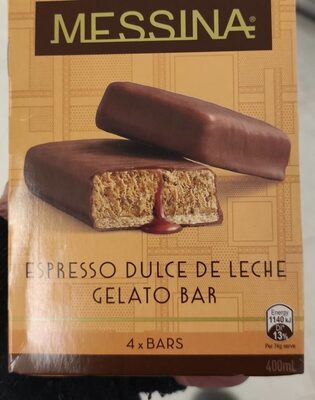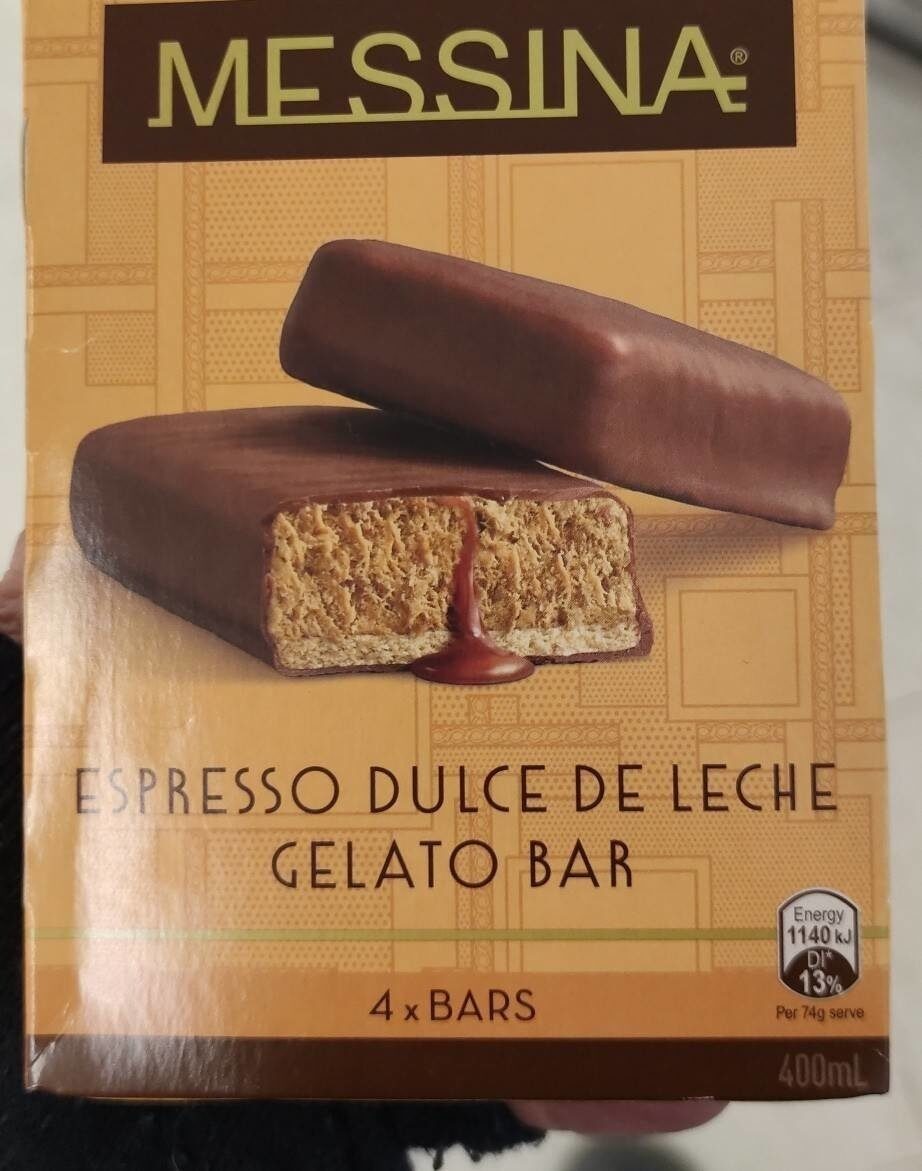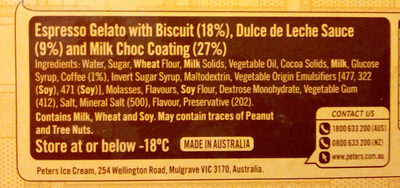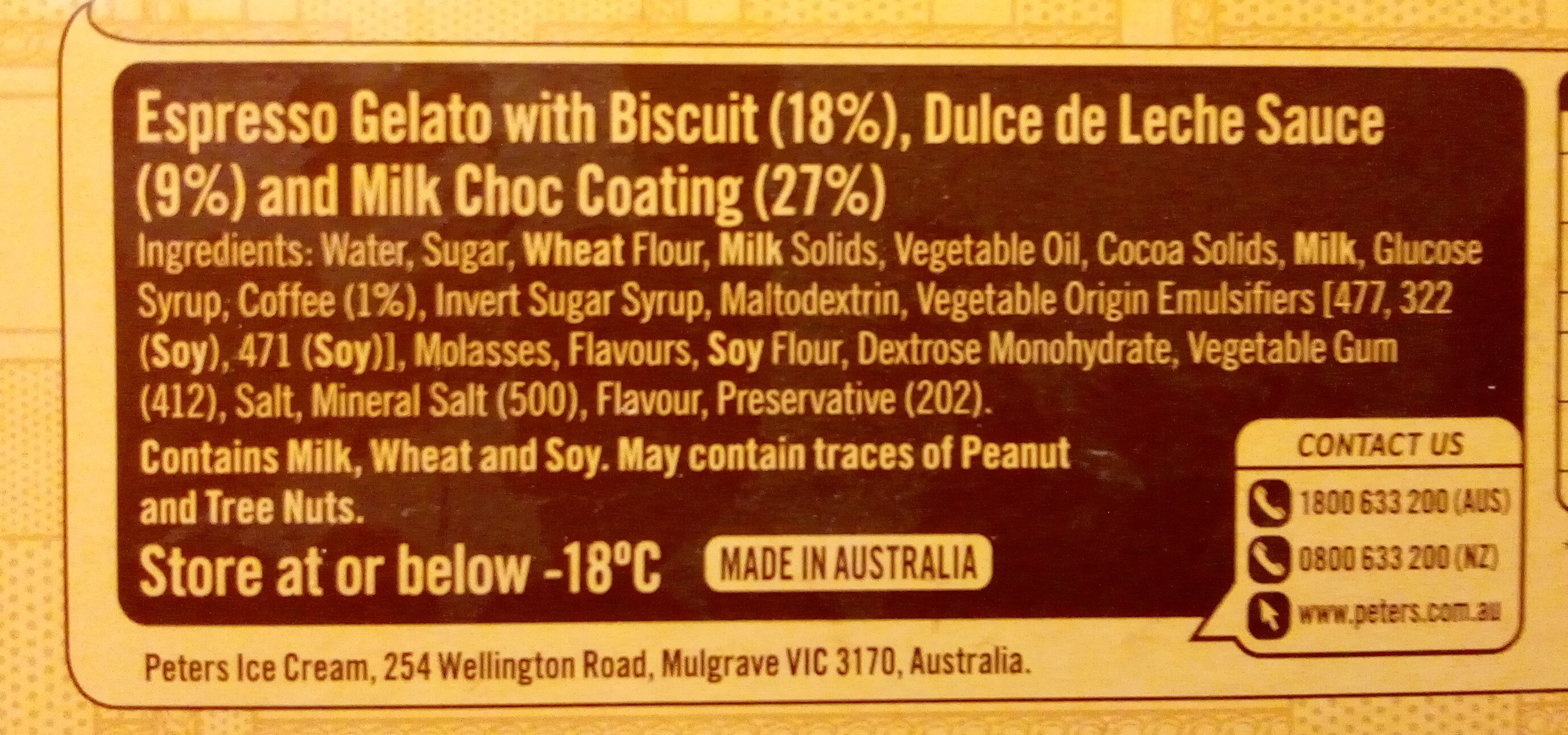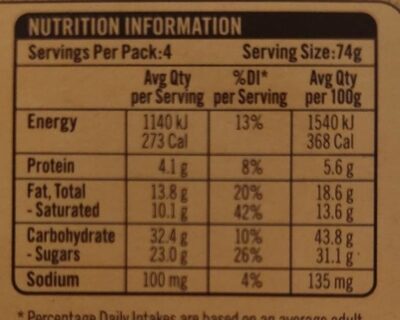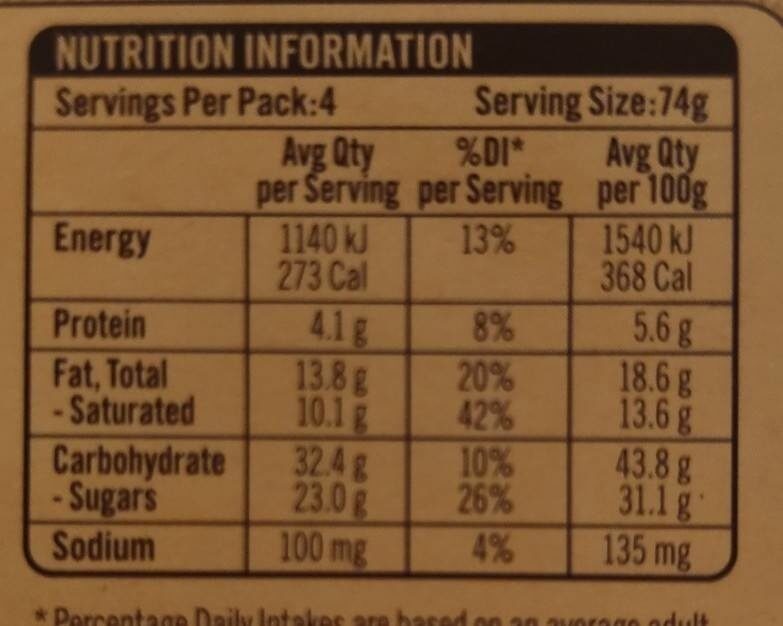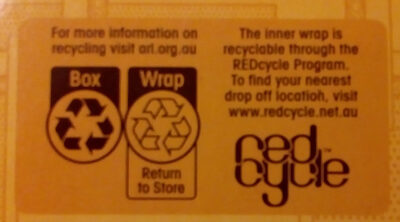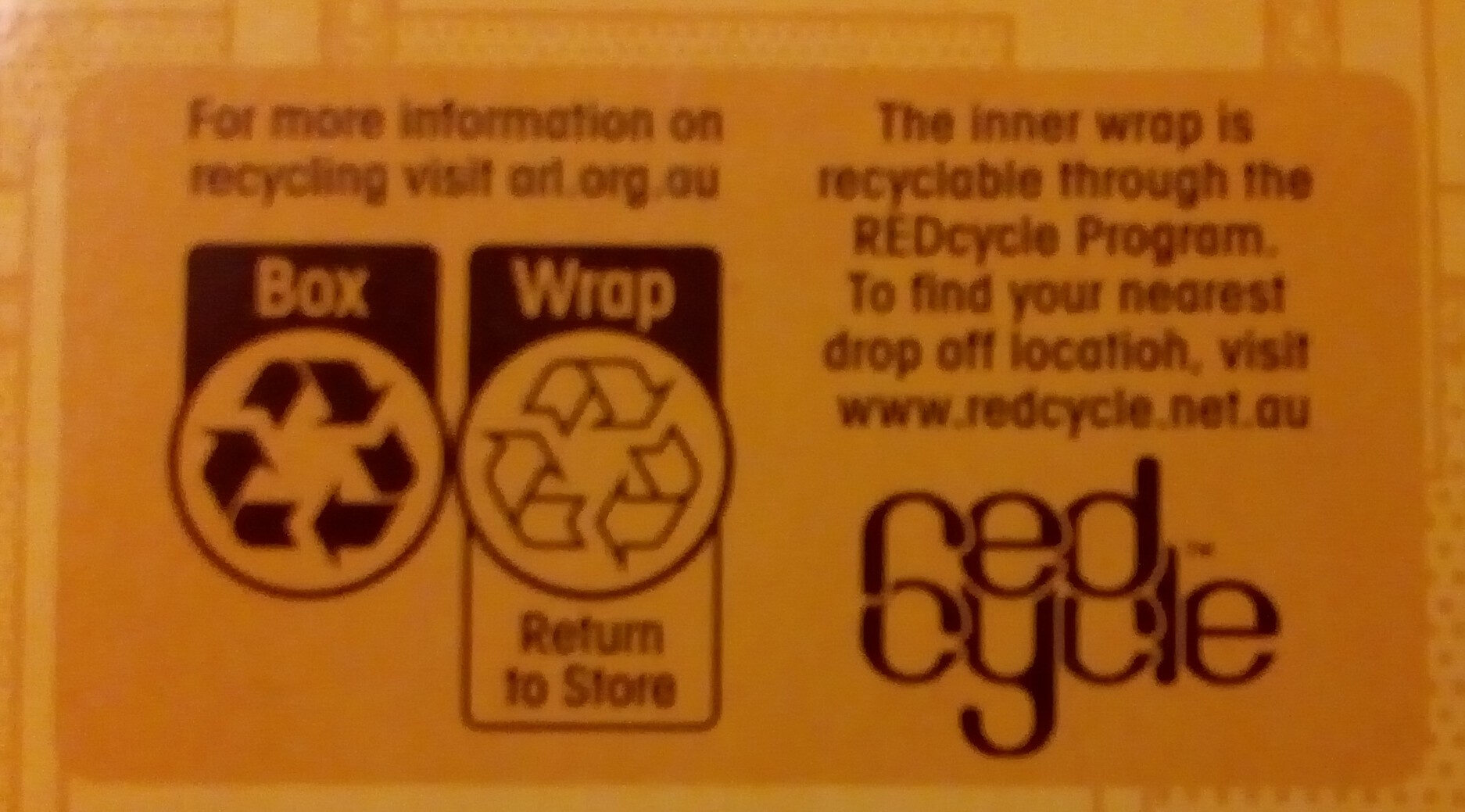Help us make food transparency the norm!
As a non-profit organization, we depend on your donations to continue informing consumers around the world about what they eat.
The food revolution starts with you!
Espresso Gelato Bar - Messina - 400ml
Espresso Gelato Bar - Messina - 400ml
Barcode: 9347043002044 (EAN / EAN-13)
Quantity: 400ml
Brands: Messina
Categories: Desserts, Frozen foods, Frozen desserts, Ice creams and sorbets, Ice creams, Ice cream bars
Origin of ingredients: Australia
Stores: Woolworths, Coles
Countries where sold: Australia
Matching with your preferences
Health
Ingredients
-
27 ingredients
Water, Sugar, Wheat Flour, Milk Solids, Vegetable Oil, Cocoa Solids, Milk, Glucose Syrup, Coffee (1%), Invert Sugar Syrup, Maltodextrin, Vegetable Origin Emulsifiers [477, 322 (Soy), 471 (Soy)], Molasses, Flavours, Soy Flour, Dextrose Monohydrate, Vegetable Gum (412), Salt, Mineral Salt (500), Flavour, Preservative (202). Contains Milk, Wheat and Soy. May contain traces of Peanut and Tree Nuts.Allergens: Gluten, Milk, SoybeansTraces: Nuts, Peanuts
Food processing
-
Ultra processed foods
Elements that indicate the product is in the 4 - Ultra processed food and drink products group:
- Additive: E322 - Lecithins
- Additive: E412 - Guar gum
- Additive: E471 - Mono- and diglycerides of fatty acids
- Additive: E477 - Propane-1‚2-diol esters of fatty acids
- Ingredient: Dextrose
- Ingredient: Flavouring
- Ingredient: Glucose
- Ingredient: Glucose syrup
- Ingredient: Invert sugar
- Ingredient: Maltodextrin
Food products are classified into 4 groups according to their degree of processing:
- Unprocessed or minimally processed foods
- Processed culinary ingredients
- Processed foods
- Ultra processed foods
The determination of the group is based on the category of the product and on the ingredients it contains.
Additives
-
E202 - Potassium sorbate
Potassium sorbate (E202) is a synthetic food preservative commonly used to extend the shelf life of various food products.
It works by inhibiting the growth of molds, yeast, and some bacteria, preventing spoilage. When added to foods, it helps maintain their freshness and quality.
Some studies have shown that when combined with nitrites, potassium sorbate have genotoxic activity in vitro. However, potassium sorbate is generally recognized as safe (GRAS) by regulatory authorities.
-
E322 - Lecithins
Lecithins are natural compounds commonly used in the food industry as emulsifiers and stabilizers.
Extracted from sources like soybeans and eggs, lecithins consist of phospholipids that enhance the mixing of oil and water, ensuring smooth textures in various products like chocolates, dressings, and baked goods.
They do not present any known health risks.
-
E412 - Guar gum
Guar gum (E412) is a natural food additive derived from guar beans.
This white, odorless powder is valued for its remarkable thickening and stabilizing properties, making it a common ingredient in various food products, including sauces, dressings, and ice creams.
When used in moderation, guar gum is considered safe for consumption, with no known adverse health effects.
-
E471 - Mono- and diglycerides of fatty acids
Mono- and diglycerides of fatty acids (E471), are food additives commonly used as emulsifiers in various processed foods.
These compounds consist of glycerol molecules linked to one or two fatty acid chains, which help stabilize and blend water and oil-based ingredients. E471 enhances the texture and shelf life of products like margarine, baked goods, and ice cream, ensuring a smooth and consistent texture.
It is generally considered safe for consumption within established regulatory limits.
-
E500 - Sodium carbonates
Sodium carbonates (E500) are compounds commonly used in food preparation as leavening agents, helping baked goods rise by releasing carbon dioxide when they interact with acids.
Often found in baking soda, they regulate the pH of food, preventing it from becoming too acidic or too alkaline. In the culinary world, sodium carbonates can also enhance the texture and structure of foods, such as noodles, by modifying the gluten network.
Generally recognized as safe, sodium carbonates are non-toxic when consumed in typical amounts found in food.
Ingredients analysis
-
May contain palm oil
Ingredients that may contain palm oil: Vegetable oil
-
Non-vegan
Non-vegan ingredients: Milk solids, MilkSome ingredients could not be recognized.
We need your help!
You can help us recognize more ingredients and better analyze the list of ingredients for this product and others:
- Edit this product page to correct spelling mistakes in the ingredients list, and/or to remove ingredients in other languages and sentences that are not related to the ingredients.
- Add new entries, synonyms or translations to our multilingual lists of ingredients, ingredient processing methods, and labels.
If you would like to help, join the #ingredients channel on our Slack discussion space and/or learn about ingredients analysis on our wiki. Thank you!
-
Vegetarian status unknown
Unrecognized ingredients: 477, 322, 471, Vegetable-gum, 412, Mineral-salt, 500, 202Some ingredients could not be recognized.
We need your help!
You can help us recognize more ingredients and better analyze the list of ingredients for this product and others:
- Edit this product page to correct spelling mistakes in the ingredients list, and/or to remove ingredients in other languages and sentences that are not related to the ingredients.
- Add new entries, synonyms or translations to our multilingual lists of ingredients, ingredient processing methods, and labels.
If you would like to help, join the #ingredients channel on our Slack discussion space and/or learn about ingredients analysis on our wiki. Thank you!
-
Details of the analysis of the ingredients
We need your help!
Some ingredients could not be recognized.
We need your help!
You can help us recognize more ingredients and better analyze the list of ingredients for this product and others:
- Edit this product page to correct spelling mistakes in the ingredients list, and/or to remove ingredients in other languages and sentences that are not related to the ingredients.
- Add new entries, synonyms or translations to our multilingual lists of ingredients, ingredient processing methods, and labels.
If you would like to help, join the #ingredients channel on our Slack discussion space and/or learn about ingredients analysis on our wiki. Thank you!
: Water, Sugar, Wheat Flour, Milk Solids, Vegetable Oil, Cocoa Solids, Milk, Glucose Syrup, Coffee 1%, Invert Sugar Syrup, Maltodextrin, Vegetable (477, 322, 471), Molasses, Flavours, Soy Flour, Dextrose Monohydrate, Vegetable Gum (412), Salt, Mineral Salt (500), Flavour, Preservative (202)- Water -> en:water - vegan: yes - vegetarian: yes - ciqual_food_code: 18066 - percent_min: 4.76190476190476 - percent_max: 92
- Sugar -> en:sugar - vegan: yes - vegetarian: yes - ciqual_proxy_food_code: 31016 - percent_min: 1 - percent_max: 31.081081081081
- Wheat Flour -> en:wheat-flour - vegan: yes - vegetarian: yes - ciqual_proxy_food_code: 9410 - percent_min: 1 - percent_max: 31.081081081081
- Milk Solids -> en:milk-solids - vegan: no - vegetarian: yes - ciqual_proxy_food_code: 19051 - percent_min: 1 - percent_max: 23.75
- Vegetable Oil -> en:vegetable-oil - vegan: yes - vegetarian: yes - from_palm_oil: maybe - percent_min: 1 - percent_max: 19.2
- Cocoa Solids -> en:cocoa-solids - vegan: yes - vegetarian: yes - ciqual_proxy_food_code: 18100 - percent_min: 1 - percent_max: 16.1666666666667
- Milk -> en:milk - vegan: no - vegetarian: yes - ciqual_proxy_food_code: 19051 - percent_min: 1 - percent_max: 14
- Glucose Syrup -> en:glucose-syrup - vegan: yes - vegetarian: yes - ciqual_proxy_food_code: 31016 - percent_min: 1 - percent_max: 12.375
- Coffee -> en:coffee - vegan: yes - vegetarian: yes - ciqual_proxy_food_code: 18003 - percent_min: 1 - percent: 1 - percent_max: 1
- Invert Sugar Syrup -> en:invert-sugar-syrup - vegan: yes - vegetarian: yes - percent_min: 0 - percent_max: 1
- Maltodextrin -> en:maltodextrin - vegan: yes - vegetarian: yes - percent_min: 0 - percent_max: 1
- Vegetable -> en:vegetable - vegan: yes - vegetarian: yes - percent_min: 0 - percent_max: 1
- 477 -> en:477 - percent_min: 0 - percent_max: 1
- 322 -> en:322 - percent_min: 0 - percent_max: 0.5
- 471 -> en:471 - percent_min: 0 - percent_max: 0.333333333333333
- Molasses -> en:molasses - vegan: yes - vegetarian: yes - ciqual_proxy_food_code: 31016 - percent_min: 0 - percent_max: 1
- Flavours -> en:flavouring - vegan: maybe - vegetarian: maybe - percent_min: 0 - percent_max: 1
- Soy Flour -> en:soya-flour - vegan: yes - vegetarian: yes - ciqual_food_code: 20900 - percent_min: 0 - percent_max: 1
- Dextrose Monohydrate -> en:dextrose-monohydrate - vegan: yes - vegetarian: yes - ciqual_proxy_food_code: 31016 - percent_min: 0 - percent_max: 1
- Vegetable Gum -> en:vegetable-gum - percent_min: 0 - percent_max: 1
- 412 -> en:412 - percent_min: 0 - percent_max: 1
- Salt -> en:salt - vegan: yes - vegetarian: yes - ciqual_food_code: 11058 - percent_min: 0 - percent_max: 0.33783783783785
- Mineral Salt -> en:mineral-salt - percent_min: 0 - percent_max: 0.33783783783785
- 500 -> en:500 - percent_min: 0 - percent_max: 0.33783783783785
- Flavour -> en:flavouring - vegan: maybe - vegetarian: maybe - percent_min: 0 - percent_max: 0.33783783783785
- Preservative -> en:preservative - percent_min: 0 - percent_max: 0.33783783783785
- 202 -> en:202 - percent_min: 0 - percent_max: 0.33783783783785
Nutrition
-
Bad nutritional quality
⚠ ️Warning: the amount of fiber is not specified, their possible positive contribution to the grade could not be taken into account.⚠ ️Warning: the amount of fruits, vegetables and nuts is not specified on the label, it was estimated from the list of ingredients: 0This product is not considered a beverage for the calculation of the Nutri-Score.
Positive points: 0
- Proteins: 3 / 5 (value: 5.5405405405405, rounded value: 5.54)
- Fiber: 0 / 5 (value: 0, rounded value: 0)
- Fruits, vegetables, nuts, and colza/walnut/olive oils: 0 / 5 (value: 0, rounded value: 0)
Negative points: 22
- Energy: 4 / 10 (value: 1540, rounded value: 1540)
- Sugars: 7 / 10 (value: 31.081081081081, rounded value: 31.1)
- Saturated fat: 10 / 10 (value: 13.648648648649, rounded value: 13.6)
- Sodium: 1 / 10 (value: 135.13513513514, rounded value: 135.1)
The points for proteins are not counted because the negative points are greater or equal to 11.
Nutritional score: (22 - 0)
Nutri-Score:
-
Nutrient levels
-
Fat in moderate quantity (18.6%)
What you need to know- A high consumption of fat, especially saturated fats, can raise cholesterol, which increases the risk of heart diseases.
Recommendation: Limit the consumption of fat and saturated fat- Choose products with lower fat and saturated fat content.
-
Saturated fat in high quantity (13.6%)
What you need to know- A high consumption of fat, especially saturated fats, can raise cholesterol, which increases the risk of heart diseases.
Recommendation: Limit the consumption of fat and saturated fat- Choose products with lower fat and saturated fat content.
-
Sugars in high quantity (31.1%)
What you need to know- A high consumption of sugar can cause weight gain and tooth decay. It also augments the risk of type 2 diabetes and cardio-vascular diseases.
Recommendation: Limit the consumption of sugar and sugary drinks- Sugary drinks (such as sodas, fruit beverages, and fruit juices and nectars) should be limited as much as possible (no more than 1 glass a day).
- Choose products with lower sugar content and reduce the consumption of products with added sugars.
-
Salt in moderate quantity (0.338%)
What you need to know- A high consumption of salt (or sodium) can cause raised blood pressure, which can increase the risk of heart disease and stroke.
- Many people who have high blood pressure do not know it, as there are often no symptoms.
- Most people consume too much salt (on average 9 to 12 grams per day), around twice the recommended maximum level of intake.
Recommendation: Limit the consumption of salt and salted food- Reduce the quantity of salt used when cooking, and don't salt again at the table.
- Limit the consumption of salty snacks and choose products with lower salt content.
-
-
Nutrition facts
Nutrition facts As sold
for 100 g / 100 mlAs sold
per serving (100.0g)Compared to: Ice cream bars Energy 1,540 kj
(368 kcal)1,540 kj
(369 kcal)+22% Fat 18.649 g 18.6 g +7% Saturated fat 13.649 g 13.6 g +19% Carbohydrates 43.784 g 43.8 g +50% Sugars 31.081 g 31.1 g +38% Fiber ? ? Proteins 5.541 g 5.54 g +69% Salt 0.338 g 0.338 g +143% Fruits‚ vegetables‚ nuts and rapeseed‚ walnut and olive oils (estimate from ingredients list analysis) 0 % 0 %
Environment
-
Eco-Score B - Low environmental impact
⚠ ️The full impact of transportation to your country is currently unknown.The Eco-Score is an experimental score that summarizes the environmental impacts of food products.→ The Eco-Score was initially developped for France and it is being extended to other European countries. The Eco-Score formula is subject to change as it is regularly improved to make it more precise and better suited to each country.Life cycle analysis
-
Average impact of products of the same category: A (Score: 87/100)
Category: Ice cream, cone (normal size)
Category: Ice cream, cone (normal size)
- PEF environmental score: 0.22 (the lower the score, the lower the impact)
- including impact on climate change: 1.75 kg CO2 eq/kg of product
Stage Impact Agriculture
56.9 %Processing
18.1 %Packaging
6.7 %Transportation
6.9 %Distribution
7.2 %Consumption
4.2 %
Bonuses and maluses
-
Origins of ingredients with a high impact
Malus:
Environmental policy: +3
Transportation: 0
Origin of the product and/or its ingredients % of ingredients Impact Australia 100 %Medium Unknown 0 %High
-
Packaging with a medium impact
Malus: -11
Shape Material Recycling Impact Unknown Plastic High Unknown Paper Low ⚠ ️ The information about the packaging of this product is not sufficiently precise (exact shapes and materials of all components of the packaging).⚠ ️ For a more precise calculation of the Eco-Score, you can modify the product page and add them.
If you are the manufacturer of this product, you can send us the information with our free platform for producers.
Eco-Score for this product
-
Impact for this product: B (Score: 79/100)
Product: Espresso Gelato Bar - Messina - 400ml
Life cycle analysis score: 87
Sum of bonuses and maluses: -11
Final score: 79/100
-
Carbon footprint
-
Equal to driving 0.9 km in a petrol car
175 g CO² per 100g of product
The carbon emission figure comes from ADEME's Agribalyse database, for the category: Ice cream, cone (normal size) (Source: ADEME Agribalyse Database)
Stage Impact Agriculture
61.0 %Processing
12.3 %Packaging
10.3 %Transportation
11.3 %Distribution
3.7 %Consumption
1.4 %
Packaging
-
Packaging with a medium impact
-
Packaging parts
(Plastic)
(Paper)
-
Packaging materials
Material % Packaging weight Packaging weight per 100 g of product Paper or cardboard Plastic Total
-
Transportation
-
Origins of ingredients
Origins of ingredients with a high impact
Origin of the product and/or its ingredients % of ingredients Impact Australia 100 %Medium Unknown 0 %High
Report a problem
-
Incomplete or incorrect information?
Category, labels, ingredients, allergens, nutritional information, photos etc.
If the information does not match the information on the packaging, please complete or correct it. Open Food Facts is a collaborative database, and every contribution is useful for all.
Data sources
Product added on by foodvisor
Last edit of product page on by kiliweb.
Product page also edited by archanox, ecoscore-impact-estimator, openfoodfacts-contributors, packbot, trolley, yuka.sY2b0xO6T85zoF3NwEKvlhNgcv6HjR7ZMTbmhhKxmcvXApHSPtVR76fnI6g.
